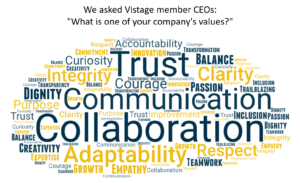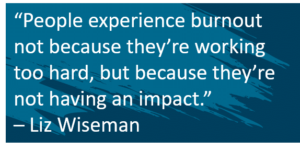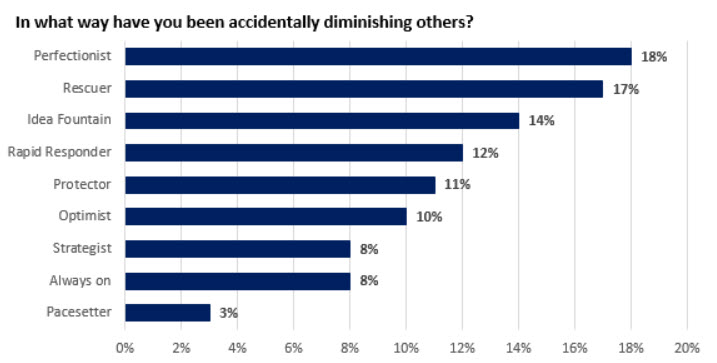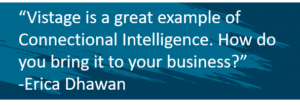People and Culture: Leadership for a better normal
The findings are clear. The latest Vistage Research report, CEO Projections 2022: Embrace the Employee Revolution states hiring is the top decision, investment and leadership challenge facing CEOs.
Vistage Sr. Director of Research Anne Petrik reflected on this as she welcomed hundreds of Vistage member attendees to the 2022 Vistage People and Culture National CEO Conference on Friday, March 25.
CEO Conference on Friday, March 25.
Delving into the report, Anne shared that the Q1 2022 CEO Confidence Index indicated 72% of CEOs report they are not able to operate at full capacity due to hiring challenges.
Employee development is being leveraged by many to drive productivity and retention as well as serve as a competitive advantage in attracting new talent.
The stage was set for a powerful event. Full of peer-to-peer interaction and applicable insights, read on for actionable learnings from keynotes and best-selling authors Liz Wiseman and Erika Dhawan.
Vistage members, please also visit The CEO’s Journey: People and Culture post-event page for keynote presentation recordings (available for a limited time), handouts and more.
LIZ WISEMAN | Multipliers: How the best leaders make everyone smarter
Imagine what is possible if you could access all the intelligence that sits in your organization.
Liz Wiseman opened her presentation with a sobering assertion for CEO attendees — not only do your teams contain more intelligence than you are tapping into, but your people may also be feeling overworked, under-utilized, and exhausted. And inadvertently, your behavior may be a root cause.
into, but your people may also be feeling overworked, under-utilized, and exhausted. And inadvertently, your behavior may be a root cause.
So why do some leaders amplify intelligence while others drain it? According to Liz, it comes down to two critical categories: Diminishers and Multipliers.
| DIMINISHERS People won’t figure it out without me |
MULTIPLIERS People are smart and will figure it out |
| Empire Builder (Hoards and under-utilizes talent) | Talent Magnet (Attracts and optimizes talent) |
| Tyrant (Creates stress that stops thinking) | Liberator (Creates space for best thinking/work) |
| Know-it-All (Tells people what to do) | Challenger (Extends stretch challenges) |
| Decision-Maker (Decides first then debates) | Debate-Maker (Drives decisions through debate) |
| Micromanager (Manages every detail) | Investor (Instills ownership and accountability) |
Liz went on to share that most diminishing activity is surprisingly not perpetrated by tyrannical leaders, but by those with the best of intentions, who harbor accidental Diminisher tendencies. Here is how event attendees rated theirs:

To be more of a Multiplier in these times of uncertainty and change, Liz recommended the following six practices:
- Instead of giving answers, ask better questions. (52% of attendees indicated they’ll move forward on this one.)
- Instead of taking up space, play fewer chips. (Play small and let others play big!)
- Instead of just hiring “smart people,” look for their native genius.
- Instead of just encouraging innovation, make sure you’re making room for mistakes.
- Instead of taking 100% of the responsibility, give 51% of the vote.
- Instead of delegating work, offer stretch challenges.
Liz closed her presentation with advice on how Diminisher leaders can start on the path toward becoming a Multiplier.
The first step, she said, is to be upfront with your team about your accidental Diminisher tendencies. This gives your team members the opportunity to push back and speak freely about how you may be holding them back. Always bear in mind: Your people show up to work every day wanting to know their work matters.
ERICA DHAWAN | Get big things done: The power of connectional intelligence
The question is no longer how will we adapt to our new normal, it’s how will we create a better normal.
Now is a moment to reimagine our connections, Erica Dhawan shared as she opened her presentation. Now is the time for leaders to ask how they’ll apply the lessons of the last two years, and create a “better normal.”
of the last two years, and create a “better normal.”
Erica suggested leaders begin via mastery of a skill called Connectional Intelligence (CxQ): The capability to unlock new and unrealized value by fully maximizing the power of networks and relationships.
It’s not what you say, Erica shared, it’s how you say it. Now is the time to build connections across departments and stakeholders, and to design ways to harness intelligence across all siloes of your business. Erica provided five principles for Connectional Intelligence:
- Choose clarity over brevity. Walk the talk, write the talk, speak the talk. Be explicit.
- Have a “communicate your mind” mindset. In all messages, in any medium, clarify your ask.
- Hold your horses. Prioritize thoughtfulness over hastiness.
- Assume the best intent. Take the time to check your bias.
- Find your voice. Consider your audience, and choose your message and medium with care.
Erica went on to share that 70% of workplace connections are a combination of digital and in-person, and 75% of “face-to-face” collaboration is non-verbal. In consideration of this, evaluate your own business acumen with the Digital Body Language Checklist below. How many criteria can you check off?

In conclusion, Erica cautioned attendees to not assume they’re getting the best out of their people but to rather create opportunities for them to bring their best to the table.
A recommended place to start in crafting this new, connectionally intelligent, “better normal” is by asking the following questions of your team with the goal of a Better Collaboration Agreement:
- What did you long for when we couldn’t physically meet?
- What did you not miss?
- What surprising new ways have you collaborated that you want to keep moving forward?
Thanks to all who joined us for this day of learning and shared perspectives. And a special thank you to our Business Resources for lending their support and expertise.
Looking ahead, mark your calendar now for Women in Leadership on June 24! This event is for female members only, with recordings available to the full Vistage community in the week to follow.
Category: Talent Management

